ADSactly Literature: Benchmark Theater - Fool for Love

We’ve talked, in the past, quite a lot about literature. We’ve discussed character archetypes, basic story plots, as well as famous literary figures such as JK Rowling and Ernest Hemingway. And looking back at all the topics we’ve covered, I realize, with dismay, that there is one field of writing, a field that is very dear to me, which we’ve ignored almost completely. I’m talking, of course, about theater. While we have talked a little about William Shakespeare’s plays, we haven’t really explored much else and it seems a shame… There is such an incredible, vast array of plays and theater writings out there. And I think it’s time we delve into that world.
The first time I went to see Sam Shepard’s ‘Fool For Love’, I really didn’t know what to expect. It was one of those spontaneous choices, mainly to do with the reputable theater it was playing at and….well, the name. ‘Fool for Love’ sounds like a play you’d like to see, doesn’t it? A sort of upbeat love story.
Well, it’s not. I sat in my chair for the next couple hours transfixed, loving every minute of it and it sparked a love for Shepard’s writing that would last me many years.
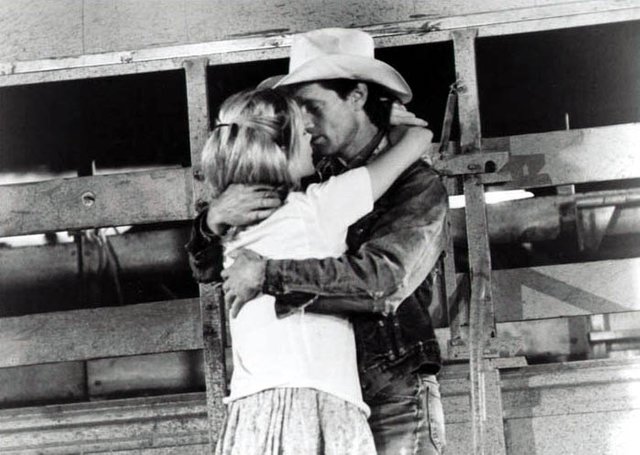
Sam Shepard and Kim Basinger as Eddie and May source
‘Fool for Love’ is the story of a destructive romance between May and Eddie. May is staying at a motel in the Mojave Desert when her old lover, Eddie, shows up and tries to convince her to get back together with him, expressing a wish to go away and live in a trailer somewhere, where he’s always dreamed of living with May.
Throughout the play, there is an “Old Man” sitting at the front of the stage, somewhat to the side of the main action, offering commentary on both the main characters, himself, and occasionally talking to each of them.
As the play unfolds, we discover that the Old Man is the father of both Eddie and May. We witness, somewhat dumbfounded as their dark past is revealed. It seems the Old Man led a double life, alternating between two families, one in which he had Eddie and in the other, May.
Unaware of this, obviously, the two met in high school and fell in love. Upon discovering what had happened, Eddie’s mother attempts to end the relationship, but fails, and in despair, shoots herself in the head.
This revelation unsettles the Old Man who, as the play progresses, slips into denial about what happened to Eddie’s mother.
Eddie and May have continued their relationship, but eventually broke up because May was worried Eddie was becoming too much like their father – he had taken to drinking and was also seeing another woman, the Countess.
The play is a to-and-fro between the two lovers, desperate for each other, but terrified of slipping back into their old destructive patters. And then of course, there is the Old Man, whose presence haunts the two protagonists and who, of course, exists only in their imagination, a shameful reminder of their incestuous love.
When Eddie arrives, May is getting ready for a date, to start maybe a new life, and Martin (her date) eventually arrives only to act as witness to the disturbing events of the play. There is a sudden explosion outside the motel, supposedly the Countess, who’s followed Eddie here, shooting up his carriage. Eddie goes out to see what’s happened and May informs Martin that Eddie is gone (for good). She packs her suitcase and leaves into the unknown, leaving the Old Man rambling and Martin thinking about the lives he’s just crossed (much like the audience).
"Amazing thing is, neither one a' you look a bit familiar to me. Can't figure that one out. I don't recognize myself in either one a' you. Never did. 'Course your mothers both put their stamp on ya'. That's plan to see. But my whole side a' the issue is absent, in my opinion. Totally unrecognizable. You could be anybody's. Probably are. I can't even remember the original circumstances. Been so long. Probably a lot a' things I forgot. Good thing I got out when I did though. Best thing I ever did." (321, The Old Man)

The Old Man in the 1985 movie adaptation source
‘Fool for Love’ is a play about memory and trauma far more than it is about love. Both Eddie and May are caught in a cycle of repeating the past and are slowly becoming their parents. May’s childhood, in her own words, was marked by desperately waiting for her father to return, waiting that eventually wore her own mother down. She is terrified of repeating her mother’s actions and allowing a wandering man to destroy her life. However, her love for Eddie wins over this fear, and she is stuck waiting for him, at least on a psychological level.
This is clear to see in the fact that May blames Eddie for returning at a bad time – exactly when she was finally over him. Only of course she wasn’t over him, since she falls back into old patterns of jealousy and desire as soon as he returns.
Eddie, in turn, is echoing their father – trying to juggle two separate lives and to be with two women, May and the Countess. For Eddie, this is an ideal rather than a fault, a symbol of manliness. This is a big subject for Eddie, as he constantly tries to establish himself in front of May and later, Martin, and intimidate them.
Interestingly, Eddie understands that their love is wrong, due to their being half-siblings, but doesn’t actually feel guilty about it, as opposed to May. He blames her for their relationship and isn’t worried about the potentially sinful nature of it.
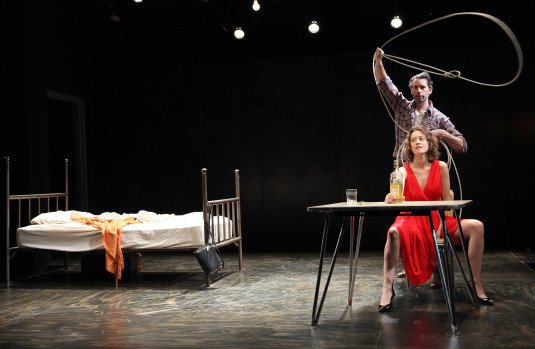
San Francisco adaptation source
Their different points of view shape their conflict and their entire relationship. While May remembers how hurtful her childhood was, being the daughter of “the other woman”, Eddie remembers their father as cold and disinterested. Their memories of events often differ and each of them struggles to maintain the story in his/her head, while at the same time maintaining the relationship with the other.
This ‘story in your head’ is a big theme throughout the play. At one point early on, the Old Man asks Eddie if he is a “fantasist”, if his goal in life is to make up stories (an obvious reference to Shepard himself, who made up stories for a living). A bit later, the Old Man tells of how he is married, in his mind, to a country star by the name of Barbara Mandrell.
"Ya' see that picture over there? Ya' see that? Ya' know who that is? That's the woman of my dreams. That's who that is. And she's mine. She's all mine. Forever." (584, The Old Man)
Barbara is a symbol for imagined lives, for the truth we tell ourselves.
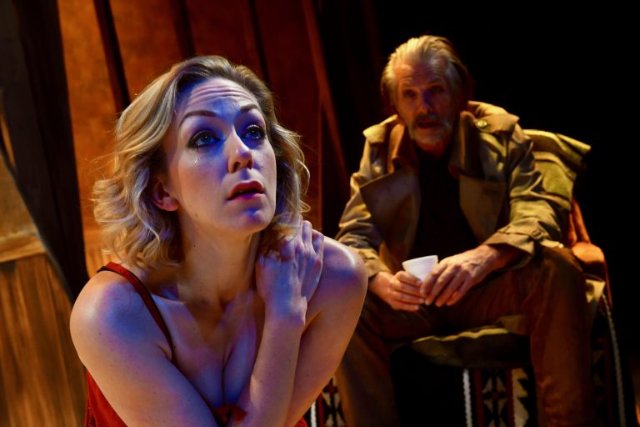
Adaptation in San Jose source
The Old Man claims that “realism” is the thing someone decides to believe and accept as reality. In other words, anything we imagine to be true is true, simply because it’s true in our heads and that is the only validation it needs.
This “realism” is clearly present in both May and Eddie, but particularly in Eddie. While May struggles with her own memory of events, she insists she will listen to the truth, rather than the fantasy in Eddie’s mind. On the other hand, Eddie is stuck in his own story about their childhood, about how they fell in love and about his own mistreatment of May. ‘Fool for Love’ is a play about strong emotions and how the characters project these emotions and their versions of events on the world outside.
Another important theme in ‘Fool for Love’ is fear of abandonment, the cycle of leaving and returning begun by the Old Man, who would frequently leave one family (without a date for his return), but always come back in the end. This ritual is carried on in his children – Eddie frequently abandons May and May always forgets and abandons Eddie from her heart, but only temporarily. He always comes back to her and she always drifts back to him. This is very well expressed in a scene at the beginning where, while refusing to talk to him (as punishment), May clings to Eddie’s knees, refusing to let go.
Oh, and it’s all autobiographical. Well, not exactly. Sam Shepard was not in love with his sister or anything like that, but most of the feelings of the play were inspired by Shepard leaving his wife at the time, O-Lan Jones, for actress Jessica Lange (the love of his life, with whom he would spend the next thirty years of his life). Something I find compelling and proof that Shepard was a writing genius is how self-critical the play is. Obviously identifying himself with Eddie and his father, he doesn’t shy away from portraying how much pain he caused the woman in his life (his wife) and himself and basically how badly he behaved.
"Falling in love is such a dumbfounding experience. In one way you wouldn’t trade it for the world. In another way it’s absolute hell." - Sam Shepard
I hope this post has sparked your interest for ‘Fool for Love’ and that you go see it as soon as possible. There have been some movie adaptations, as well, including one in 1985 that stars Shepard himself as Eddie, although Shepard later said that was a mistake, as it took away the personal feeling of the theater.
What about you, are you a Shepard fan? What do you think about the themes we’ve discussed?
Authored by @honeydue
Original Thumbnail Pic
References: 1 2 3 4
Click on the coin to join our Discord Chat

Witness proposal is here:
Go To Steem Witness Page
In the bottom of the page type: adsactly-witness and press vote.

Use small letters and no "@" sign. Or, click here to vote directly!
Thank you!
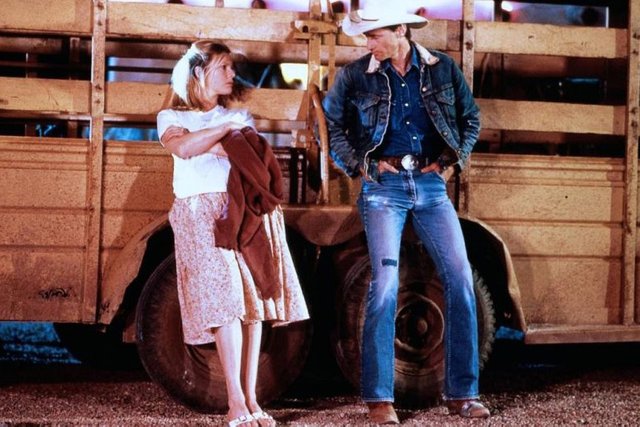
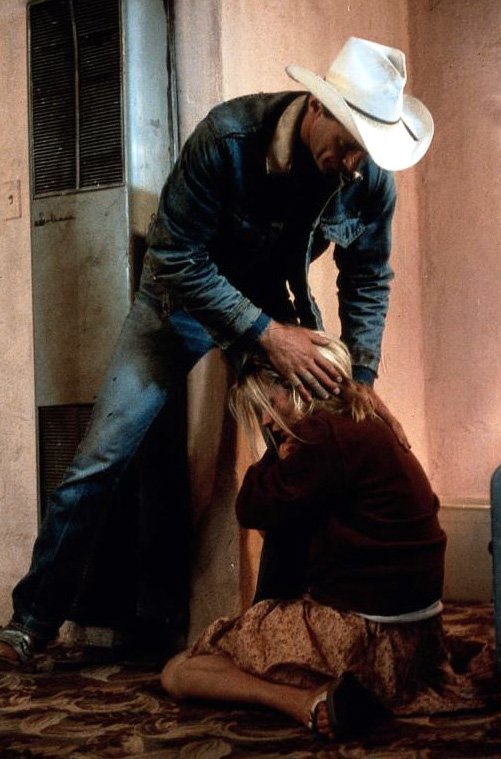
I haven't had the opportunity to read the play or see it in the theatre, but I do remember seeing the film. Love is a hackneyed theme in the arts, but I think the difference lies in the way love is approached. In Loco por Amor, we see various forms of love, from the brother, to the father, to the lover, to oneself. And through each form, viewers see how love makes us all idiots. I remember seeing this film and being paralyzed by some discoveries that are being made in history. There's something so strange and hypnotizing, almost bizarre, about this film that you can't explain. To imagine the character of the old man in the play is interesting, almost morbid. I think I'm going to see it again. Thank you so much for bringing this story back to my mind, @honeydue.
I haven't had the opportunity to follow Sam Shepard's dramaturgical work, but I have been able to follow much of his performance in films based on his plays or scripts. You mean Fool for love, which I remember quite well and I was interested not only in the subject, but the performance of Shepard and another actor that I appreciate very much: Harry Deam Stanton, also knowing that it was a film directed by the genius of American cinema that was Robert Altman. The desolate perspective with which love is treated in this work, as well as the theme of affective memory, are also in a film from a previous year (one of my favourites): Paris, Texas. Based on a screenplay by Shepard, starring Harry Deam Stanton and Nastassja Kinski. We are confronted with a vision very similar to that of Fool for love.
Thank you for your illustrative post, @honeydue. Greetings.